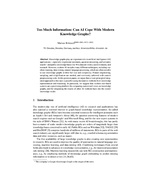Too Much Information: Can AI Cope With Modern Knowledge Graphs?
From International Center for Computational Logic
Too Much Information: Can AI Cope With Modern Knowledge Graphs?
Markus KrötzschMarkus Krötzsch
Markus Krötzsch
Too Much Information: Can AI Cope With Modern Knowledge Graphs?
In Diana Cristea, Florence Le Ber, Baris Sertkaya, eds., Proceedings of the 15th International Conference on Formal Concept Analysis (ICFCA 2019), volume 11511 of LNCS, 17--31, 2019. Springer
Too Much Information: Can AI Cope With Modern Knowledge Graphs?
In Diana Cristea, Florence Le Ber, Baris Sertkaya, eds., Proceedings of the 15th International Conference on Formal Concept Analysis (ICFCA 2019), volume 11511 of LNCS, 17--31, 2019. Springer
- KurzfassungAbstract
Knowledge graphs play an important role in artificial intelligence (AI) applications – especially in personal assistants, question answering, and semantic search – and public knowledge bases like Wikidata are widely used in industry and research. However, modern AI includes many different techniques, including machine learning, data mining, natural language processing, which are often not able to use knowledge graphs in their full size and complexity. Feature engineering, sampling, and simplification are needed, and commonly achieved with custom preprocessing code. In this position paper, we argue that a more principled integrated approach to this task is possible using declarative methods from knowledge representation and reasoning. In particular, we suggest that modern rule-based systems are a promising platform for computing customised views on knowledge graphs, and for integrating the results of other AI methods back into the overall knowledge model. - Projekt:Project: CPEC, DIAMOND, HAEC B08, Wikidata
- Forschungsgruppe:Research Group: Wissensbasierte SystemeKnowledge-Based Systems
@inproceedings{K2019,
author = {Markus Kr{\"{o}}tzsch},
title = {Too Much Information: Can {AI} Cope With Modern Knowledge Graphs?},
editor = {Diana Cristea and Florence Le Ber and Baris Sertkaya},
booktitle = {Proceedings of the 15th International Conference on Formal
Concept Analysis (ICFCA 2019)},
series = {LNCS},
volume = {11511},
publisher = {Springer},
year = {2019},
pages = {17--31},
doi = {10.1007/978-3-030-21462-3_2}
}

